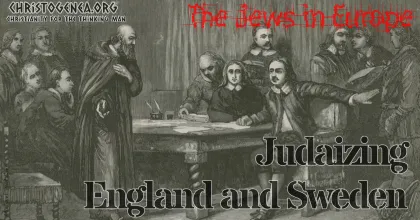The Jews in Europe: Judaizing England and Sweden

The Jews in Europe: Judaizing England and Sweden
Before we proceed with a short summary of the Jewish presence and influence in 17th century England, we should take a brief moment to look at the Jewish presence and influence in contemporary Sweden. Perhaps the Swedes missed an opportunity in saving England from Judaism, at least temporarily, when Christina the Swedish queen rejected the advances of Manasseh ben Israel. But in truth, she had already had enough Jews of her own.
We do not like to use Jewish sources for our studies, and we strongly dislike quoting Jews unless we are quoting them critically. But on some topics relating to Jews, some of their writers are worthy of quoting, so long as we can corroborate their statements independently. So the following excerpt is from a book written by a Jew named David S. Katz, entitled Menasseh ben Israel’s Mission to Queen Christina of Sweden, 1651 - 1655:
With perfect hindsight, one often sees Menasseh ben Israel’s career as leading inexorably to his mission to Oliver Cromwell in 1655, when he came to London to plead for the readmission of the Jews to England, nearly four centuries after their expulsion. At least this is how the events of the 1650s appear if one begins with the Whitehall Conference of 1655 and follows the thread back to the first tentative overtures toward England from Amsterdam. Even after the publication of The Hope of Israel in 1650, however, it was not apparent that Menasseh would soon be devoting himself to the cause of Anglo-Jewry. On the contrary, it was immediately after the appearance of the rabbi’s influential book that he began maneuvering for a place in the retinue of the notorious Christina, queen of Sweden. Only after he failed to obtain a position among her band of foreign scholars did Menasseh devote himself wholeheartedly to the readmission of the Jews to England. Other Jews had managed to win themselves a place in Christina’s circle. so Menasseh’s scheme was quite practicable. If Queen Christina had accepted the rabbi’s proposals with more alacrity, the history of seventeenth century Anglo-Jewry would have been very different indeed.








 Please click here for our mailing list sign-up page.
Please click here for our mailing list sign-up page.








Recent comments